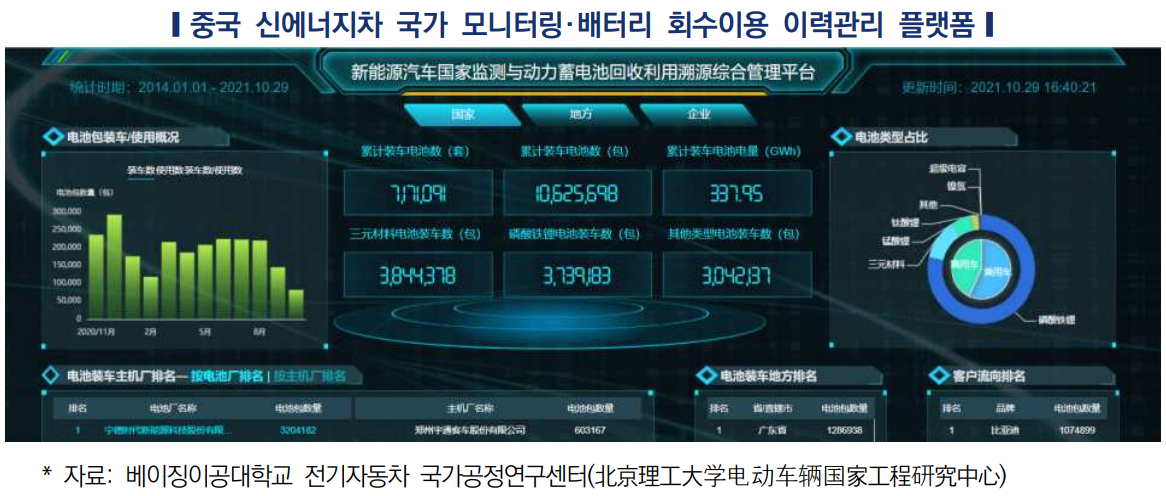사용후 배터리 재사용·재활용 산업 활성화를 위해 전주기 이력정보 관리체계 구축이 필요하며 중국의 사례를 비추어볼 때 초기 시장의 불확실성을 완화하고 건전성을 높이기 위한 보완책을 도입할 필요가 있다는 전문가의 의견이 제기됐다.
글로벌 전기차 폐차 2050년 4,227만대…사용후 배터리 시장 급성장
사용후 배터리 전주기 정보 모니터링하는 이력정보 관리체계 구축 必
사용후 배터리 재사용·재활용 산업 활성화를 위해 전주기 이력정보 관리체계 구축이 필요하며 중국의 사례를 비추어볼 때 초기 시장의 불확실성을 완화하고 건전성을 높이기 위한 보완책을 도입할 필요가 있다는 전문가의 의견이 제기됐다.
이서현 한국자동차연구원 선임연구원은 ‘배터리 재사용·재활용 산업 활성화 방향’을 제목으로 한 보고서에서 2030년을 전후로 사용후 배터리 시장규모가 대폭 확대될 전망이며 전기차 산업경쟁력을 위해서는 사용후 배터리 재사용·재활용 산업 활성화가 중요하다고 전했다.
SNE Research에 따르면 글로벌 전기차 폐차 대수는 2030년 411만대, 2050년 4,227만대, 글로벌 사용후 배터리 시장 규모는 2030년 약 70조원에서 2050년 약 600조원으로 증가할 전망이다.
환경·공급망·경제성 등을 고려할 때, 사용후 배터리 재사용·재활용이 필수다.
사용후 배터리를 재사용·재활용하지 않으면 폐기물이 지속 증가하게 되며, 적절한 처리를 거치지 않고 방치하거나 매립·소각할 경우 유해물질이 발생하여 환경오염을 유발할 수 있다.
또한 리튬·니켈·코발트 등 배터리 핵심 원료는 고가이며 공급망 리스크가 높은데, 배터리 재활용을 통해 고순도 원료를 확보한다면 공급망 다각화, 전기차 원가 절감 등을 달성할 수 있다.
이서현 선임연구원은 이번 보고서에서 사용후 배터리 재사용·재활용 산업 활성화를 위해서는 전주기 이력정보 관리체계 구축이 필요하다고 강조했다.
한국환경연구원도 관련 산업을 활성화하기 위해서는 배터리 입고 단계부터 배터리 상태 진단결과, 등급 분류, 안정성 검사, 출고 이력까지 사용후 배터리 전주기 정보를 모니터링할 수 있는 이력정보 관리체계가 필요하다고 전한 바 있다.
배터리의 생산·판매·사용 관련 정보뿐만 아니라 회수·운반 과정 정보 또한 사용후 배터리 성능평가와 재사용·재활용 판단에 중요한 근거가 될 수 있다.
이서현 선임연구원은 중국 사례를 고려할 때 우리나라는 민간 자율성을 최대한 보장하는 방향으로 관련 정책을 추진하되 초기 시장의 불확실성을 완화하고 건전성을 높이기 위한 보완책을 도입할 필요가 있다고 전했다.

▲중국 신에너지차 국가 모니터링·배터리 회수이용 이력관리 플랫폼(그림 출처: 한국자동차연구원 ‘배터리 재사용·재활용 산업 활성화 방향’ 보고서)
중국은 생산자책임제, 이력 추적 플랫폼 구축, 적격 기업 선정 등 사용후 배터리 관리체계 또한 주요국보다 앞선 시기인 2018년부터 도입·운영했으며 관련 기술, 회수 전문성 등을 평가하여 적격기준을 충족한 ‘화이트리스트 기업’을 선정하는 등 적극적인 정책을 펴나갔다.
2018년 1월 ‘신에너지차 배터리 회수이용관리 잠정조치’를 제정하여 사용후 배터리 재활용 주책임을 완성차 제조사가 지게 하고, 신에너지차 국가 모니터링·배터리 회수이용 이력관리 플랫폼을 구축했다.
중국 정부는 여기서 그치지 않고 2023년 12월 관련 기업의 책임을 강화하는 법률을 입안해 중국 정부가 배터리 회수·재사용·재활용 적격 기업을 지정하고 있으나 중국 완성차 제조사는 적격 기업 여부를 고려하지 않고 사용후 배터리를 경매로 판매하고 있다.
현지 언론은 비적격 기업이 사용후 배터리를 재활용하는 과정에서 환경오염이 유발되며, 적격 기업이 배터리를 수급하지 못해 관련 기술 개발 및 규모의 경제 달성이 지연되는 문제가 있다고 분석했다.
또한 2022년 리튬 등 원료 가격 상승기에는 특히 단기차익을 얻으려는 소규모 불법작업장이 클러스터를 형성하여 탄산리튬, 삼원계 배터리를 수급한 뒤 블랙파우더로 만들면 배터리 재활용 기업 등이 이를 구매하여 후처리하는 구조가 횡행했다.
소규모 불법작업장은 자재 재활용, 후처리 공정 등을 적절하게 수행하지 못해 원료 재활용 효율 또한 낮다.
현지 언론은 행정 여력 상 비적격 기업을 제재·관리하기 쉽지 않으며, 이에 따라 적격 기업이 고품질의 사용후 배터리를 수급하기 어려워 적격 기업의 재활용 처리시설 유휴율이 높은 편이라고 보도했다.
이에 중국 정부는 2023년 12월 ‘신에너지차 배터리 종합이용 관리법’ 초안을 입안하여 관련 기업의 책임 및 이력정보 제공 의무 등을 강화했다.
2018년 1월 발표한 신에너지차 배터리 회수이용관리 잠정조치를 법률로 격상, 배터리 재활용에 대한 기업의 책임소재를 강화하고 공업신식화부 주도하에 부처 간 이력 추적 정보공유 메커니즘을 구축하도록 했다.
관련 업계 일각에서는 해당 법률안에 더해 비적격 기업에 대한 제재·처벌을 강화하고 적격 기업에 대한 조세·재정 지원 혜택을 증대해야 한다고 주장했다.
한편 우리나라는 2023년 12월 관계부처 합동으로 발표한 ‘이차전지 전주기 산업경쟁력 강화 방안’은 사용후 배터리의 민간 자율거래를 최대한 보장하며 시장실패 시 보완 방안을 마련한다는 기본 방향성을 제시했다.
다만 배터리 재사용·재활용 분야는 초기 단계로 시장 불확실성이 높은 바, 관계부처 합동안은 규제성 장벽을 낮추되 최소한의 안전기준 준수 및 배터리 이력 정보제공 의무를 부과하는 내용을 포함했다.
정부는 재제조·재사용 기준을 충족하는 사용후 배터리를 제품으로 인정하여 폐기물 규제를 면제하고 재활용 과정의 중간 가공품(블랙파우더 등)을 재활용 제품으로 인정하여 완화된 사업허가를 통해 사업을 추진하게 할 것이라 발표했다.
또한 사용후 배터리 전주기 이력 정보 관리체계를 2027년까지 구축하고 이 정보에 기반하여 민간주도 거래시장 지원 및 공급망 강화 등 정책적 활용을 촉진하며 배터리 활용 주체, 성능평가자에 제조부터 순환이용(재제조·재사용·재활용)까지 단계별 정보 입력 의무를 법제화할 예정이다.
한편 배터리 재활용 사업은 현재 수익성이 낮아 기업이 대규모 투자를 단행하기 어려운 상황이므로 기업의 초기 투자를 지원하기 위한 조세·재정 지원 혜택 증대를 검토할 필요가 있다.
